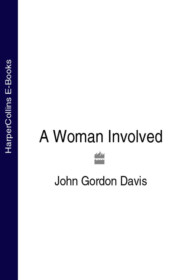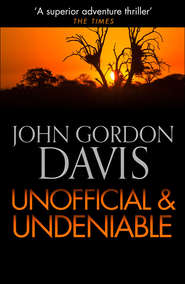По всем вопросам обращайтесь на: info@litportal.ru
(©) 2003-2024.
✖
Fear No Evil
Автор
Год написания книги
2018
Настройки чтения
Размер шрифта
Высота строк
Поля
He started walking back up the mountain. She started hurrying painfully after him.
About half a mile up the mountain, on a rocky outcrop, sat Sam, on guard, thumping his tail in welcome.
She would remember it disjointedly: her body aching, her head light from not enough sleep; the unreality of the forest, the animals, the twittering of the birds through her harried thoughts; the whole extraordinary thing. The big Indian sat, waiting. The gentleness behind his bulk, the quiet strength that did not need to be leashed because it was so … confident? So gentle that she did not want to upset him by breaking her bargain. She would, she had to—but at the right moment.
And the strange, beautiful wolf-dog, Sam. He was so serious, ears cocked, staring fixedly up the mountainside. Suspicious of her, tolerating her only because of the Indian’s presence. She wanted him to accept her, she wanted to stretch out and fondle him, tell him he was a good dog. But she didn’t—it would almost have been a presumption, an intrusion into such professionalism. But all the while was the frustration of waiting.
‘Does Sam understand?’
The wolf laid his ears back, but did not turn.
‘Sure.’
‘That he’s on guard for pursuers?’
Big Charlie looked at her. ‘Of course. He’s trained.’
Of course. It seemed a silly question now. ‘What’ll he do if he sees anybody coming? Bark?’
‘Run and wake Davey. He knows he’s got to keep his mouth shut unless it’s a real emergency.’
Oh, lovely Sam …
‘Is he very fierce?’
A wisp of a smile crossed Charlie’s face.
‘He’s pretty friendly.’
‘But would he attack?’
‘Only if he had to. Then he’d be fierce. But usually his bark’s worse than his bite.’
She smiled. ‘How does he like the other animals?’
‘He likes them fine. He’s used to them.’
‘But he’s never had to herd them before.’
‘No. I guess he’s not too crazy about that. They’re all pretty big.’ He added. ‘The big cats, he’s not too keen on them.’
For the first time in a long time she smiled, and tears burned in her eyes. Oh, Sam …
‘I don’t blame him,’ she whispered. ‘Does he chase ordinary cats?’
‘If he gets the chance. But with these big ones? He’s not stupid, Sam.’
They both smiled. It was a little shared amusement at Sam’s expense. Then the moment passed. Charlie looked solemn again.
‘And the other animals? Do you think they understand what’s happening?’
Big Charlie looked surprised. ‘Sure.’
She felt almost foolish.
‘But how?’
He looked at her. ‘Because they know. That they’re out of their cages and running away: Davey’s telling them to run.’ He added, They can feel what each other’s feeling. They know. There’s a—sort of bond between them. To follow and run. Can’t you feel it?’
Yes, she could. But no, she did not believe it. Not a bond, a common purpose, to run away from their cages. Surely they wanted to be back in their cages, where it was safe; they were frightened, that’s why they were running. They were only keeping together because they were frightened, and because they were trained animals, and because Davey Jordan was the only security blanket they had.
The silence returned. Just the occasional cheeping of a bird. The vast, eerie wilderness. Her nerves were tight with the waiting—waiting for David Jordan to wake up so she could try to talk him out of this madness.
Then, completely silently, he was there. Sam’s tail thumped in greeting; she looked around, and he was standing behind her: a lean young man, with the most penetratingly gentle eyes she had ever seen.
Afterward, when she tried to remember what she said, how she said it, whether she had spoken too forcefully or not, she was unable to reconstruct it fully. She was articulate; she had been on her university debating team; she knew what she was talking about; she could be forceful when she wanted to be—overly emotional perhaps, but she defended herself and what was right. What she would remember was feeling blustery and impotent against this quiet, gentle man, who refused to argue with her, who listened to her politely enough but who did not want to talk to her at all, who did so only as an act of hospitality. He was a private man who seemed to know what she was going to say, who had heard it all before; a man who had made all his decisions, and no matter what she said and pleaded and preached, would remain unmoved.
But she remembered him saying, almost reluctantly, ‘I was there the day those baby elephants arrived from India. At Kennedy airport, in the middle of the night. They were reaching out for each other with their trunks, for comfort. Pushing their trunks into each other’s mouths, and everybody was saying. ‘Ah, aren’t they cute!’ But nobody felt bad for taking those poor animals away from their natural home.’ He’d looked at her, and she would remember his quiet intensity. ‘Because people are strange, Dr. Johnson. Somehow they think it’s all right to make animals unhappy, and treat them as curiosities. I remember the vet saying, “I got a real live baby elephant.”’ He’d looked at her, puzzled. ‘In prison, Dr. Johnson. For life. And yet that vet was a kind man.’ He shook his head. ‘Every day you see those animals in their cages—pacing up and down, up and down. For the rest of their lives … You’ve seen it in your zoo, seen it in the Central Park Zoo.’
She would remember protesting, ‘Kindly don’t compare us with Central Park. That zoo’s a disgrace.’
He said quietly: ‘All zoos are, Doctor. Your Bronx Zoo is worse. Because you’re the famous New York Zoological Society, with all the money and all the university degrees. But you’ve got all those tiny cages. Outside in the grounds there are hundreds of acres for people to walk around enjoying themselves looking at the unhappy animals … innocent animals, who’ve committed no crime.’
She had started to interrupt, but he went on quietly.
‘And we look at that miserable animal in its cage and say, ‘Isn’t that interesting—look at the elephant.’ What kind of creature are we, that takes pleasure in another creature’s misery? Even though we like that animal …’
‘That’s not all there is to it. Mr. Jordan. Zoos do a great deal toward conserving animal life—and educating the public.’
For a moment he had looked as if he were going to argue with her, then he just said, kindly, ‘I can’t understand you, Dr. Johnson. You’re a vet. All the good things you can do. Heal animals …’ He looked at her in real puzzlement. ‘You’re a kind person. But you’re really a prison doctor. You’re a doctor who wants to keep his prisoners forever, Dr. Johnson. Not send them home when they’re better—just keep them in prison forever so you can admire them.’
She had been absolutely indignant. ‘Rubbish!’
‘It’s as if you went to Africa and captured all kinds of black people, brought them back here, and stuck them in cages as Montezuma did, so people could go and look at them on Sundays with their children.’
‘Rubbish! There’s no comparison. Animals aren’t people.’
But he’d withdrawn, as if he regretted having let himself be drawn out at all, sorry for having hurt her feelings unnecessarily, because she would never understand.
Later, cooled down, she tried again.
‘But what are you trying to do, Mr. Jordan? I mean—please believe me, I love these animals as much as you do, and I deeply resent your calling me a prison doctor. But what are you trying to achieve? Are you hoping to make such an impression with this extraordinary feat that the whole world is going to be up in arms against zoos and somehow just turn their animals loose in the forests around London and Los Angeles and Tokyo? If so you’re wrong.’
But he was not going to argue about it, because she would never understand. When he spoke it was not in reply, but rather an articulation of a private thought.
‘There is a way of life, a way of thinking, of … behaving toward other men and your fellow creatures … toward all living things … toward the whole earth, and the sky, and the sun … that is based on love. On compassion. On respect. On cherishing everything there is around you, because it’s wonderful. Unique. It’s natural and … good, and it evolved that way all by itself. It’s got to be cherished. And if we think like that, and live that kind of life, we can all have our freedom, we can all have our happiness. … We can all feel the sun, and smell the grass and smell the flowers and look upon each other with … appreciation …’
“That’s the Garden of Eden. It doesn’t exist anymore. Maybe in parts of Africa. But you can’t try to re-create it in the United States of America.’











